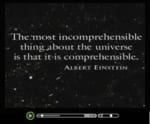Origin Of The Universe
(Read Origin Of The Universe, Part 1 First)
Origin of the Universe - Post "Bang" Problems
The IUTs are essentially no better an attempt to explain the origin of the universe without God than the Big Bang. The primary differences between the IUTs and the original Big Bang Theory are really pre-bang explanations. What happened just prior to the explosion? What happened during the first millisecond of the explosion? For instance, some of the IUTs have included a concept called the 'epoch of inflation' to explain the dynamic first millisecond after the Bang. However, the basic premise of all these theory variants is the same -- the universe was compacted into a little cosmic ball that subsequently exploded with a big bang into everything that exists today. Thus, the IUTs share the same post-bang problems that plague the original Big Bang Theory. These problems include violations of established Natural Laws, such as:
-
(i) The Law of Causality (observed effects require a related cause),
(ii) The Law of Conservation of Angular Momentum (observed phenomena like retrograde motion in our solar system are impossible without an intervening cause), and
(iii) The Laws of Thermodynamics (Conservation of Matter/energy and Increased Entropy).
Origin of the Universe - Long Ago and Far Away...
Attempts to exclude a Creator from the "origin of the universe equation" have been long on theoretical calculations and short on common sense. The various models merely move the questions of where, why and how did everything get here to "long ago and far away." Atheists are tenacious in their efforts to ignore the necessity of a First Cause, Intelligent Designer, Creator God. But as Aldous Huxley put it so eloquently, "Facts do not cease to exist because they are ignored." And it seems that atheists must ignore a great deal in order to maintain their atheistic cosmogonic position. Is the entire universe really the result of an accidental explosion of nothing? Is the design and irreducible complexity of all living systems really the result of random chance? Where is the so-called "evolutionary mechanism"? 21st century "science" has declared that anything sounding "supernatural" is entirely off limits. Yet, by common sense definition, "science" based on the Big Bang and IUTs must suspend and/or violate established natural laws. In effect, atheistic science must use "supernatural" means to justify its atheistic presupposition.
Prior to the last 150 years, and the recent campaign to exclude God in the scientific fields, scientists as a general rule believed in God. As a matter of fact, the founders of a majority of the scientific disciplines were Theists. These men took pride in the idea that they were "thinking God's thoughts after Him." Please consider these final thoughts... If everything is an accident, there's no reason to figure anything out. If everything is futile, purpose is an imaginary concept. But if everything was created, and if everything has a purpose, shouldn't it be the underlying goal of all mankind to discover that Creator and find that purpose? And so we endeavor to discover our Creator and fulfill our purpose, while using science as merely one of our tools.

